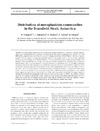Identificador persistente para citar o vincular este elemento:
https://accedacris.ulpgc.es/jspui/handle/10553/48556
| Título: | Distribution of meroplankton communities in the Bransfield Strait, Antarctica | Autores/as: | Vázquez, E. Ameneiro, J. Putzeys, S. Gordo, C. Sangrá Inciarte, Pablo |
Clasificación UNESCO: | 251005 Zoología marina 2510 Oceanografía |
Palabras clave: | Meroplankton Bransfield Strait Antarctica Invertebrate larvae Distribution, et al. |
Fecha de publicación: | 2007 | Editor/a: | 0171-8630 | Publicación seriada: | Marine Ecology - Progress Series | Resumen: | The spatial distribution of meroplankton in Bransfield Strait, Antarctica, and its relationships with hydrographical conditions are described. Biological sampling was carried out with BIONESS sampling gear at 19 stations and at 5 depths between 10 and 300 m. The main hydrographic features were a shallow hydrographic front in the southern part of the strait that separates Transitional Zonal Water with Bellingshausen influence (TBW) from Transitional Zonal Water with Weddell influence (TWW) and a slope front, the so-called Bransfield front, along the South Shetland Islands Slope (SSI). A northeastward baroclinic jet known as the Bransfield Current (BC) originates from this slope front. The meroplankton community was very diverse and included 12 types of larvae, dominated by polychaete and echinoderm larvae. The meroplankton were more abundant closer to the SSI in the BC and decreased in number towards the Antarctic Peninsula. Polychaete larvae were found close to both shores but mainly close to the SSI in TBW; they were very sparse in the central basin, appeared again below 100 m depth in TWW, and increased in abundance in upper layers at stations between the hydrographic front and the Antarctic Peninsula, in TWW. By contrast, echinoderm larvae mainly occupied the central basin and were always associated with the upper 100 m in TBW, just above the polychaete larvae; they were almost absent from TWW. In summary, meroplanktonic larval exhibit a strong dependence on water masses, depth, and fronts. | URI: | https://accedacris.ulpgc.es/handle/10553/48556 | ISSN: | 0171-8630 | DOI: | 10.3354/meps338119 | Fuente: | Marine Ecology Progress Series [ISSN 0171-8630], v. 338, p. 119-129 |
| Colección: | Artículos |
Citas SCOPUSTM
19
actualizado el 08-jun-2025
Citas de WEB OF SCIENCETM
Citations
19
actualizado el 01-feb-2026
Visitas
96
actualizado el 07-sep-2024
Descargas
91
actualizado el 07-sep-2024
Google ScholarTM
Verifica
Altmetric
Comparte
Exporta metadatos
Los elementos en ULPGC accedaCRIS están protegidos por derechos de autor con todos los derechos reservados, a menos que se indique lo contrario.
